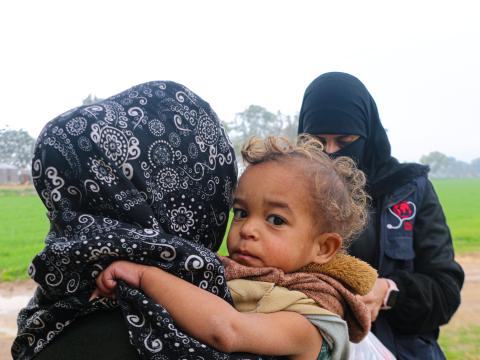We all know that Enough is Enough


Syria, the country that has been tormented by war for the past 13 years has a looming crisis on the horizon. Malnutrition is on an alarming rise among Syrian children.
While the conflict wreaks havoc across the land, children struggle with finding food. Is it fate to just accept, either victims of indiscriminate bombing or lack of food?
Is this the future children await?
Malnutrition is a dichotomy of simplicity and complexity. Recovery is a lengthy and dangerous process. When a body has been deprived of something vital for so long, it learns how to survive without it but simultaneously pays a hefty price. For as long as it can, it learns new ways to preserve every breath, cell and every bit of energy not knowing when its last straw will be.
When it comes to food, the body might sustain itself for so long before eventually giving up. Starvation is a slow and agonising process consisting of three phases. The first is when the body does everything it can to maintain normal blood sugar levels by breaking down glucose in the bloodstream until running out. This results in reduced glucose levels supplying the brain affecting cognitive abilities. During the second phase, the body begins using stored fats turning them into energy. After that enters phase three which is the most dangerous. It's when the body begins breaking down muscles to supply itself with protein which eventually runs out. All of these processes weaken the body's immune system leading most starved victims to perish from infections or tissue breakdown.
The issue is, losing so many vital nutrients and going through invasive processes isn't simple to recover from and doesn't end with just providing the patient with "food". Simply, no amount of food can reverse the years of malnutrition.
Therefore, intervention during the first phase is crucial for people suffering from malnutrition, especially children. Food is gradually introduced. For many malnourished children, supplements like nutrition bars are a lifeline.
As Syria remains one of the top ten countries with the highest hunger rates in the world, we at World Vision Syria Response share a remarkable story of hope.
Enas*, a 23-month-old child who was on the brink of death hadn't her mother's cries been heard. Her body fought a crisis that stole other children and currently stunts the growth of 609,900 other children.
Little did her mother know that forcibly abandoning her home in 2019 would mean her child wouldn't have access to food. Now they are settled in a displacement camp in the Northwest where the Syrian hunger crisis started leaving its marks on her baby too.
With the dwindling humanitarian support, millions of Syrians found themselves at a crossfire not being able to find anything to eat. It was also challenging for Enas's father to find a job when unemployment rates reached 34% in 2022. Meanwhile, the mother does her best to provide for the family through working on a farm but the pay is nowhere near enough to support the family of eight.
With time, Enas's mother couldn't recognise her daughter anymore. Just when she was running through hell trying to secure medical care for her, there was a knock on the door. Enas's mother rushed to open the door, perhaps hoping it was a relief bag after the distribution was halted due to budget cuts. But it was the help she needed, the help Enas desperately required.
It was the mobile nutrition teams, who conducted frequent visits across Syrian displacement camps to combat the rising malnutrition rates. Our partner's team Physicians Across Continuants provides nutrition services to women and children in addition to necessary medical interventions.
Enas was inside and as soon as the team examined her, malnutrition was evident. "She was suffering from acute malnutrition, we noticed that her family's living situation was very challenging, they had many children and no proper shelter," one of the staff who oversaw Enas's recovery.
She adds, "Enas couldn't move, her body was weak, she couldn't play, her immune system was weak and couldn't protect her from minor viruses".
The mother shares, "I have tried everything within my power but she lacked variety in her diet and we could feed her one meal per day". Thankfully, Enas was recovering and the team kept visiting her for a couple of months and providing her with medical care.
Finally, it was time to weigh Enas and she gained two KGs! This filled Enas's mother with joy! Her child blossomed in front of her eyes, she is eager to play with other children. They got their child back and so did 1.2 million others.

World Vision Syria Response implements a dozen nutrition projects in Syria with multiple partners, Physicians Across Continuants is one of them.
*Name has been changed to protect identity.